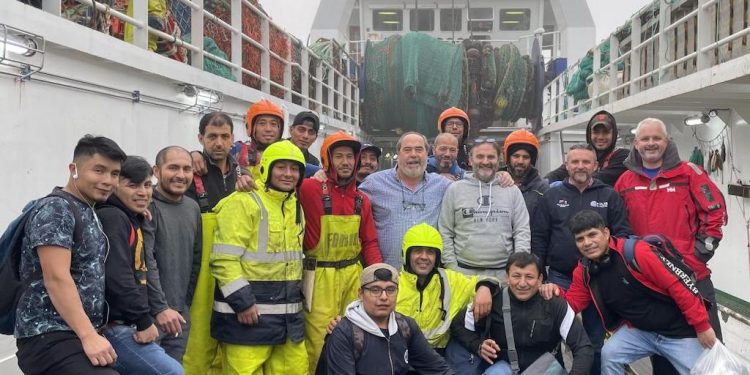A recent visit to the Falkland Islands by Human Rights at Sea (HRAS) to conduct an independent review of fishing licensing, related enforcement, and improvements for onboard crew safety and welfare, saw three leading companies opened their doors to scrutiny. This included access to one of the licensed squid fishing vessels and its crew at sea.
Polar Seafish Ltd and Dragon Fishing and Trading Company Ltd licensed by the Falkland Islands Government (FIG) along with Argos Froyanes Ltd, licensed by the South Georgia Government and the UK Government, have detailed their company positions on several review areas concerning onboard crew working conditions and resources.
These include mandatory safety training in the presence of flag and class personnel, access to Wi-Fi, accommodation facilities, remote medical support, complaints procedure, company code of conduct, incident reporting and remediation, access to onshore welfare services and access to fresh food supplies.
Polar Seafish operates three vessels with 180 crew with a focus on fishing for Loligo squid (Doryteuthis gahi) which spawns off the Falkland Islands coast.
As a British-Norwegian partnership, Argos Froyanes is focused on the sustainable capture of Patagonian toothfish (Dissostichus eleginoides) and operates three vessels and circa 85 crew from the Falkland Islands to fish around South Georgia and South Sandwich Islands (SGSSI) Maritime Zone. Engaging with HRAS, Argos have also shared detailed responses to HRAS queries around onboard crew working conditions and resources.
‘As a company, we strive to provide our crew with the best possible working conditions and support them in every aspect of their work and personal life while at sea. We believe that providing them with work clothing, food, accommodation, training, medical care, continued employment, and taking care of them from when they leave their home until they return is crucial,’ said Polar Seafish managing director Alex Reid.
‘Crew welfare in the modern fishing industry suffers from historic bad performance or current bad performance by certain countries/flag states/regulators. We welcome this opportunity to showcase what some areas of the modern fishing industry are like, albeit in a very hostile and remote area like the South Atlantic,’ commented Andrew Newman of Argos.
With 30 licensed South Korean squid jigger vessels, each with 48 crew and totalling around 1500 crew on board during a season, Dragon Fishing and Trading Company Ltd are responsible for one of the larger fleets operating in Falklands waters.
To date, it is reported to HRAS that all vessels have been raised to a standard where they voluntarily comply with ILO C188 and the 1993 Torremolinos Protocol, superseded by the 2012 Cape Town Agreement, neither of which are yet enacted in South Korea. Auditing by a third party is voluntary.
It is reported to HRAS that in 2022 one vessel was sent back to Montevideo to rectify onboard safety equipment and associated training. It was delayed by nearly two weeks before returning to the fishery. When it was subsequently internally assessed that for the 2023 season, the vessel in question was one of the best prepared.
‘Korean owners have been at the forefront of change for the Falkland Island Jigger fleet. Co-operation from the [South] Korean Flag State (KOMSA) and Korean Class Society (KR) has bought about a common approach where safety is being improved collectively,’ said managing director Wendy Shelbourne.
‘This change has not been without financial cost, but there is a determination to show that the [South] Korean fleet is committed to a long-term presence on the South Atlantic waters.’









